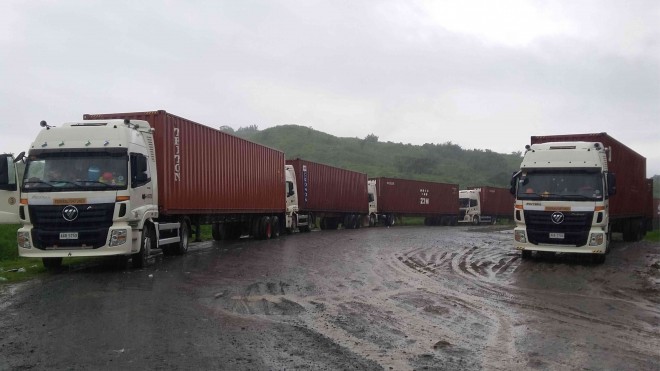Firm stops dumping of Canada trash

CONTAINERS carrying illegally shipped trash from Canada are parked at the compound of a sanitary landfill in Capas, Tarlac province on Thursday. These containers are the last to reach and leave the landfill after the Bureau of Customs’ contractor stopped the disposal following protests from Tarlac officials and residents.TONETTE OREJAS/INQUIRER CENTRAL LUZON
TARLAC CITY—A contractor of the Bureau of Customs (BoC) on Thursday canceled a deal to accept and bury 29 more containers of illegally shipped trash from Canada in a sanitary landfill in Capas, Tarlac province.
Rufo Colayco, president and chief executive officer of Metro Clark Waste Management Corp. (MCWMC), announced the firm’s decision while being questioned by Board Member Carlito David during the first public hearing of the Tarlac provincial board on the issue.
Colayco said the MCWMC, as of July 8, had unloaded garbage from 26 containers, “whose contents are not toxic,” in its landfill in Sitio Kalangitan, Capas.
“We have not unloaded the eight [containers delivered on Wednesday night]. We’re sending these [back to BoC]. And I will notify [Customs Commissioner Alberto] Lina about us not accepting the balance [of the 55 containers],” Colayco said when David asked for an inventory of the containers whose contents had been unloaded.
BoC seized the containers in 2013 because these were misdeclared as scrap plastic, in violation of the Tariff Code of the Philippines.
Article continues after this advertisementVice Gov. Enrique Cojuangco Jr. said Colayco’s solution would not solve the problem. “This foreign waste is going to other places in the Philippines,” he said.
Article continues after this advertisementHe said the Senate needs to be involved in determining what laws are needed to stop the dumping of imported wastes, toxic or non-hazardous, in the Philippines. The country is a signatory to the Basel Convention that bans such action.
Colayco did not contest the letter of Gov. Victor Yap directing Lina to “refrain from further dumping of wastes coming from areas not approved by the Sangguniang Panlalawigan of Tarlac.”
Cojuangco, in an interview, said Colayco has to put into writing his statements to the board.
Colayco said he decided to end the contract with BoC to unburden Tarlac of the fear of toxic wastes or of the shame of being the recipient of foreign wastes.
“We are the victims in this whole episode because people think we accepted toxic wastes. No, we didn’t,” he said.
“The disposal contract costs P1 million, with the local shipper, Le Soleil, footing the bill to recover the containers,” he said.
The Environmental Management Bureau declared the contraband to be “municipal solid wastes” and recommended these to be shipped back to Canada. Le Soleil, however, got the approval of a Manila court to recover the containers for its international counterpart, Zim.
Colayco was confident that Lina would not sue him or MCWMC for not completing the job for the national government.
In the hearing, Cojuangco said the 50 containers were “smokescreens” to divert attention from five containers supposedly filled with “real toxic wastes.”
Cojuangco, however, declined to elaborate or name his informant.
Gerardo Macatangay, chief of the BoC’s disposal division, said all 55 containers were properly accounted for and documented.
Macatangay told the board that the importer, identified as Jim Makris, has been missing. Makris, he said, also brought in 48 containers of wastes in January 2014.
The Canadian Embassy, in a statement, said the waste was neither toxic nor hazardous.
It said they were “mixed household recyclable materials collected in Canada…for recycling in the Philippines,” denying that Canada violated the Basel convention on hazardous wastes.
The embassy said it had worked closely with the Philippine government on the shipment.
“The government of the Philippines considered options to dispose of the shipment in an environmentally sound manner in accordance with its laws and regulations,” it said. With a report by Niña Calleja in Manila